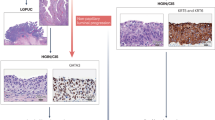Bladder cancer is a major cause of health expenses and it presents formidable clinical challenges. Two types of tumors have been identified, papillary and non-papillary. The former are mainly characterized by FGFR3 and chromosome 9 alterations and a low frequency of Tp53 alterations. The latter are characterized by a high frequency of alterations in genes in the p53 and Rb pathways. Chromosome 9 alterations, specially in 9q, are crucial to bladder cancer development and occur in both types of tumors. Progression of some superficial tumors (mainly TaG3 and T1G3) to high-grade, invasive, carcinomas provides evidence of some overlap between the two pathways. Distinct gene expression profiles have been identified in superficial and invasive tumors. The stage is now ready for the clinical application of this knowledge.
Similar content being viewed by others
Author information
Authors and Affiliations
Corresponding author
Additional information
*Supported by an unrestricted educational grant from Sanofi-Aventis.
Rights and permissions
About this article
Cite this article
Luis, N.M., López-Knowles, E. & Real, F.X. Molecular biology of bladder cancer. Clin Transl Oncol 9, 5–12 (2007). https://doi.org/10.1007/s12094-007-0003-x
Issue Date:
DOI: https://doi.org/10.1007/s12094-007-0003-x




